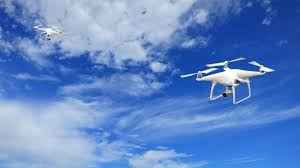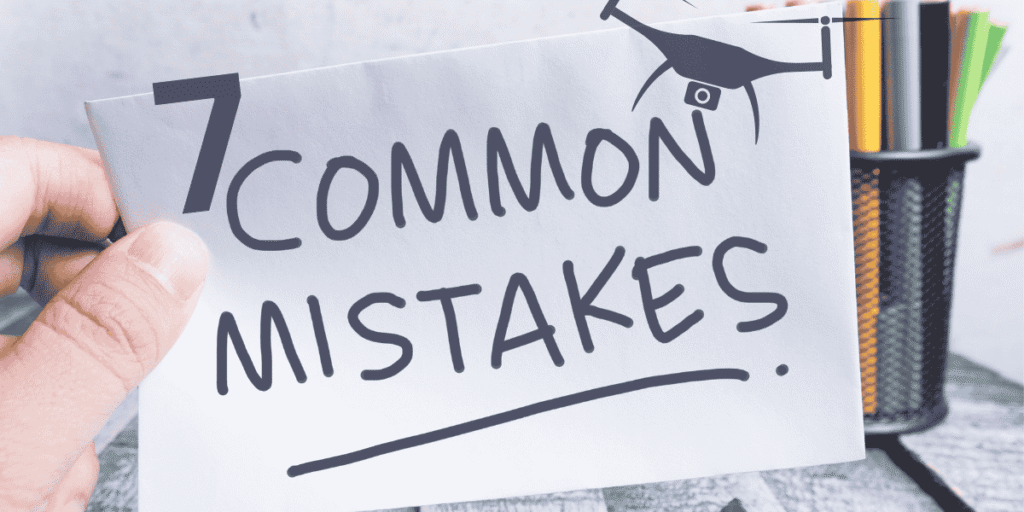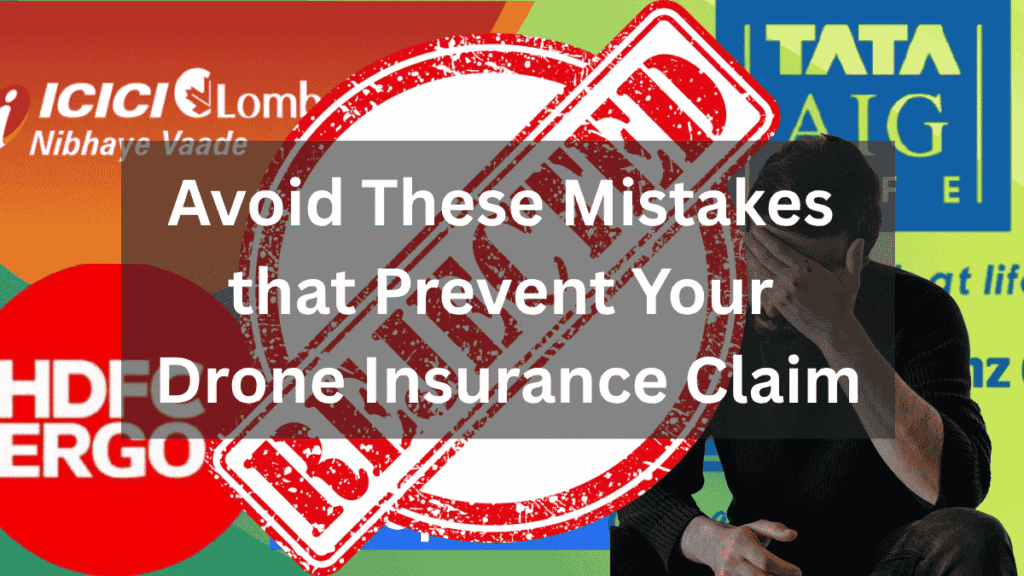Drones are transforming industries across India, from agriculture to filmmaking, but their operation carries inherent risks. Understanding the Mistakes that Prevent Your Drone Insurance Claim from being approved is crucial for protecting your investment. A comprehensive drone insurance policy safeguards against financial losses, yet avoidable errors can lead to drone claim rejection in India. Non-compliance with regulations or policy terms may void drone insurance, leaving you vulnerable. A robust drone insurance claim process requires adherence to drone insurance terms and conditions to ensure your drone pilot insurance India remains valid.
This blog delves into seven common pitfalls that result in denied drone claims and provides actionable solutions to secure your UAV insurance policy India, helping you operate with confidence and avoid costly rejections.
Drone Insurance in India

The drone industry in India is soaring, with applications ranging from aerial photography to disaster management. However, the risks associated with drone operations—crashes, third-party damage, or theft—make insurance indispensable. The Directorate General of Civil Aviation (DGCA) mandates third-party liability insurance for commercial drone operations, underscoring the importance of compliance with DGCA drone rules.
A drone insurance policy typically covers physical damage to the drone, third-party liabilities, and sometimes specialized add-ons like Beyond Visual Line of Sight (BVLOS) or night flying coverage. Yet, even with a solid policy, claims can be denied due to oversight or non-compliance with drone insurance terms and conditions. This blog dives deep into the seven critical mistakes drone operators make that lead to drone claim rejection in India and offers actionable tips to ensure your drone accident claim is processed smoothly.
The Importance of Drone Insurance
Drones, or Unmanned Aerial Vehicles (UAVs), are sophisticated and often expensive pieces of equipment. A single crash can result in repair costs running into lakhs, while damage to third-party property or injuries can lead to substantial legal liabilities. Drone insurance policy in India provides a financial safety net, covering damages to the drone, payload, and third-party liabilities. However, drone coverage exclusions—specific scenarios where the policy doesn’t apply—can catch operators off guard. Understanding these exclusions and adhering to drone usage compliance is crucial to maintaining valid coverage. Failing to do so risks denied drone claims, leaving operators to bear the financial burden of accidents.

Mistake #1: Failing to Comply with DGCA Drone Rules
Understanding DGCA Drone Rules
The DGCA drone rules govern all drone operations in India, ensuring safety and accountability in the airspace. These rules categorize drones by weight (Nano, Micro, Small, Medium, Large) and impose requirements like obtaining a Unique Identification Number (UIN), registering on the Digital Sky Platform, and securing an Unmanned Aircraft Operator Permit (UAOP) for commercial operations. Non-compliance with these regulations is a leading cause of drone claim rejection India.
Common Compliance Errors
- Operating Without a UAOP: Commercial drone operators must obtain a UAOP from the DGCA. Flying without this permit violates drone flying rules India and can void drone insurance. Insurers often require proof of a valid UAOP to process a drone accident claim.
- Ignoring No-Fly Zones: The DGCA designates Red Zones (restricted areas like airports or military installations) and Yellow Zones (controlled airspace requiring permission). Flying in these areas breaches drone usage compliance and can lead to denied drone claims.
- Exceeding Altitude Limits: Drones must adhere to altitude restrictions (e.g., 50 feet for Nano drones, 400 feet for others in Visual Line of Sight). Violating these limits can invalidate your drone insurance policy.
How to Avoid This Mistake?
- Register your drone on the Digital Sky Platform and obtain a UIN.
- Secure a UAOP for commercial operations and keep it updated.
- Use tools like TropoGo’s Air Sherpa to check permissible flying zones.
- Adhere to altitude and Visual Line of Sight (VLOS) requirements as per DGCA drone rules.
By ensuring drone usage compliance, you reduce the risk of drone claim rejection India due to regulatory violations.
Mistake #2: Providing Inaccurate Information to Insurers
The Importance of Transparency
When purchasing a drone insurance policy, operators must provide accurate details about the drone’s specifications, usage, and operational history. Inaccurate or incomplete information can be considered a breach of contract, leading to void drone insurance or denied drone claims.
Common Errors in Disclosure
- Incorrect Drone Specifications: Misreporting the drone’s model, weight, or modifications can lead to claim denials. For instance, if you upgrade your drone’s camera or payload without informing the insurer, your drone accident claim may be rejected.
- Misrepresenting Usage: Declaring a drone as recreational when it’s used commercially can invalidate the policy. Commercial operations require specific coverage, and misrepresentation can result in drone claim rejection India.
- Failing to Disclose Previous Incidents: Not reporting past crashes or claims can lead to denied drone claims, as insurers rely on this information to assess risk.
How to Avoid This Mistake?
- Provide accurate details about your drone’s make, model, and modifications during the application process.
- Clearly specify whether the drone is used for recreational or commercial purposes.
- Update your insurer promptly about any changes in drone usage or equipment.
- Maintain transparency about past incidents to ensure your UAV insurance policy India remains valid.
Transparency with your insurer is key to avoiding drone coverage exclusions and ensuring smooth claim processing.
Mistake #3: Ignoring Policy Exclusions and Terms
Understanding Drone Coverage Exclusions
Every drone insurance policy includes drone coverage exclusions, which outline scenarios where coverage does not apply. Failing to understand these exclusions can lead to unexpected drone claim rejection.
Common Exclusions
- Flying in Restricted Areas: As mentioned, operating in Red or Yellow Zones without permission can void drone insurance.
- BVLOS or Night Flying Without Add-Ons: Standard policies often exclude Beyond Visual Line of Sight (BVLOS) or night operations unless specific add-ons are purchased.
- Illegal Activities: Using drones for unauthorized purposes, such as delivering prohibited substances, can lead to denied drone claims.
- Wear and Tear: Damage due to gradual wear or lack of maintenance is typically excluded from coverage.
How to Avoid This Mistake?
- Carefully read the drone insurance terms and conditions before purchasing a policy.
- Discuss exclusions with your insurer and consider add-ons for BVLOS or night flying if needed.
- Avoid using your drone for activities not covered by the policy.
- Regularly maintain your drone to prevent claims being denied due to neglect.
Understanding drone coverage exclusions ensures you operate within the policy’s scope, reducing the risk of drone claim rejection India.
Mistake #4: Neglecting Pre- and Post-Flight Checklists
The Role of Checklists in Drone Operations
Implementing pre- and post-flight checklists is a best practice for drone usage compliance. These checklists ensure the drone is in optimal condition and that all safety protocols are followed, which is critical for a successful drone accident claim.
Common Checklist Oversights
- Skipping Pre-Flight Inspections: Failing to check for physical damage, battery levels, or software updates can lead to accidents that insurers may deem preventable, resulting in denied drone claims.
- Ignoring Weather Conditions: Flying in adverse weather (e.g., strong winds or heavy rain) violates drone flying rules India and can void drone insurance.
- Neglecting Post-Flight Logs: Not maintaining detailed flight logs can hinder your ability to provide evidence for a drone insurance claim.
How to Avoid This Mistake?
- Develop a comprehensive pre-flight checklist covering drone condition, battery status, and weather conditions.
- Use apps like TropoGo’s Log Analyzer to maintain accurate flight logs.
- Conduct post-flight inspections to identify and document any issues immediately.
- Ensure all checklist data is available to support your drone accident claim.
Proper checklists demonstrate responsible operation, strengthening your case with insurers and preventing drone claim rejection India.
Mistake #5: Delaying or Failing to Report Incidents
Importance of Timely Reporting
Prompt reporting of accidents or incidents is a critical requirement of most drone insurance terms and conditions. Delays or failure to report can lead to denied drone claims, as insurers need timely information to assess claims accurately.
Common Reporting Errors
- Delayed Notification: Many policies require notifying the insurer within 24 hours of an incident. Delays can result in drone claim rejection India.
- Incomplete Documentation: Failing to provide required documents, such as flight logs, UIN, or photos of the damage, can hinder claim processing.
- Not Reporting to Authorities: Incidents involving third-party damage or injuries must be reported to the DGCA, police, or other relevant authorities. Non-compliance can void drone insurance.
How to Avoid This Mistake?
- Notify your insurer immediately after an incident, ideally within 24 hours.
- Gather all necessary documentation, including photos, flight logs, and police reports, to support your drone accident claim.
- Report incidents to the DGCA or other authorities as required by DGCA drone rules.
- Keep a record of all communications with your insurer for reference.
Timely and thorough reporting ensures your drone insurance claim is processed efficiently, minimizing the risk of rejection.
Mistake #6: Operating Without Proper Training or Certification
The Role of Pilot Certification
For commercial drone operations, the DGCA requires operators to hold a Remote Pilot Certificate (RPC). Operating without this certification violates drone flying rules India and can lead to denied drone claims.
Common Certification Mistakes
- Flying Without an RPC: Commercial operators without a valid RPC risk drone claim rejection India, as insurers require proof of certification.
- Expired Certifications: Allowing your RPC to lapse can void drone insurance for incidents occurring during that period.
- Inadequate Training: Lack of proper training can lead to accidents deemed preventable by insurers, resulting in denied drone claims.
How to Avoid This Mistake?
- Enroll in a DGCA-approved Remote Pilot Training Organization (RPTO) to obtain an RPC.
- Keep your certification current and renew it as required.
- Regularly update your skills through training to demonstrate competence to insurers.
- Include proof of certification when filing a drone accident claim.
Proper training and certification enhance your credibility and ensure compliance with DGCA drone rules, safeguarding your drone pilot insurance India.
Mistake #7: Choosing an Inadequate Insurance Policy
Selecting the Right Coverage
Choosing the wrong drone insurance India policy can leave you underinsured or without coverage for specific risks, leading to denied drone claims. A policy that doesn’t align with your operational needs can be as detrimental as having no insurance at all.
Common Policy Selection Errors
- Opting for Basic Coverage: Recreational pilots might choose minimal coverage, but commercial operators need comprehensive policies including third-party liability and hull coverage.
- Ignoring Add-Ons: Failing to include add-ons for BVLOS, night flying, or payload coverage can result in drone coverage exclusions.
- Not Comparing Providers: Different insurers offer varying terms, premiums, and coverage limits. Failing to compare can lead to an inadequate UAV insurance policy India.
How to Avoid This Mistake?
- Assess your drone’s value, usage, and operational risks before selecting a policy.
- Consider add-ons for specialized operations like BVLOS or night flying.
- Compare policies from reputable providers like TropoGo, HDFC ERGO or TATA AIG to find the best fit. For details visit Top 5 Best Drone Insurance Companies In India.
- Review drone insurance terms and conditions to ensure coverage meets your needs.
Choosing a tailored drone insurance policy ensures comprehensive protection and reduces the risk of drone claim rejection India.
Additional Tips for Successful Drone Insurance Claims
- Maintain Detailed Records: Keep thorough records of flight logs, maintenance history, and insurance correspondence to support your drone accident claim.
- Understand Deductibles: Be aware of deductibles (typically 2-2.5% of the claim amount) to avoid surprises during claim settlement.
- Appeal Rejections: If your claim is denied, review the reasons and appeal with additional evidence or through dispute resolution processes.
- Stay Updated on Regulations: Regularly check for updates to DGCA drone rules to ensure ongoing drone usage compliance.
FAQs
1. What are the most common reasons for drone claim rejection in India?
Common reasons include non-compliance with DGCA drone rules, such as flying without a UAOP or in restricted zones, providing inaccurate information to insurers, ignoring drone coverage exclusions, skipping pre- and post-flight checklists, delaying incident reporting, operating without a Remote Pilot Certificate (RPC), and choosing an inadequate drone insurance policy.
2. How can I ensure compliance with DGCA drone rules to avoid claim denials?
Register your drone on the Digital Sky Platform, obtain a Unique Identification Number (UIN), secure an Unmanned Aircraft Operator Permit (UAOP) for commercial operations, and adhere to altitude and Visual Line of Sight (VLOS) restrictions. Use tools like Air Sherpa to verify permissible flying zones to maintain drone usage compliance.
3. What should I include in my drone insurance application to prevent issues?
Provide accurate details about your drone’s make, model, weight, modifications, and intended use (recreational or commercial). Disclose any past incidents or claims and update your insurer promptly about changes in usage or equipment to avoid breaches of drone insurance terms and conditions.
4. What are drone coverage exclusions, and how can I avoid them?
Drone coverage exclusions are scenarios where your policy doesn’t apply, such as flying in restricted zones, BVLOS operations without add-ons, or damage from neglect. Review your policy’s terms, discuss add-ons for specialized operations, and maintain your drone to ensure coverage aligns with your activities.
5. Why is timely incident reporting important for a drone insurance claim?
Most drone insurance policies require reporting incidents within 24 hours. Delays can lead to denied drone claims as insurers need timely data to assess claims. Promptly notify your insurer, provide documentation like flight logs and photos, and report to authorities if required by DGCA drone rules.
6. Do I need a Remote Pilot Certificate for recreational drone flying?
No, recreational pilots don’t need a Remote Pilot Certificate (RPC), but commercial operators must obtain one from a DGCA-approved Remote Pilot Training Organization (RPTO). Flying commercially without an RPC can void drone insurance and lead to drone claim rejection India.
7. How do I choose the right drone insurance policy in India?
Assess your drone’s value, usage, and risks. Opt for comprehensive coverage, including third-party liability and hull protection for commercial operations. Consider add-ons for BVLOS or night flying, compare providers like TropoGo or HDFC ERGO, and review drone insurance terms and conditions to ensure your UAV insurance policy India meets your needs.
Conclusion
Securing a drone insurance policy is a critical step for responsible drone operations, but avoiding common mistakes is equally important to prevent drone claim rejection India. By complying with DGCA drone rules, providing accurate information, understanding drone coverage exclusions, using checklists, reporting incidents promptly, obtaining proper certification, and choosing the right UAV insurance policy in India, you can ensure your drone insurance claim process to be accomplished smoothly. These practices not only protect your financial investment but also demonstrate professionalism and compliance with drone flying rules in India. Whether you’re a hobbyist or a commercial operator, avoiding these seven mistakes will help you maintain valid drone pilot insurance India and fly with confidence.
Also Read – Drone Insurance Cost In India

